Are you looking for ways to spruce up your writing with ChatGPT?
The road to perfect writing is always under construction. You can never call a piece of written work truly finished. There’s always something that can be done better, maybe a more specific verb can be used, maybe an adverb has crept in that is weakening your argument, or maybe a sentence has been so poorly constructed that you are losing readers left, right, and center.
No matter how long you’ve been writing or how new you are, your writing can always get better. Thankfully, the days of relying on actual human proofreaders now seem to be in the past, courtesy of ChatGPT.
ChatGPT, an OpenAI-trained powerful language model, can not only revise your entire piece of written text, but it can also proofread it, and point out errors, improvements, or shoddy sentence constructions.
You might also like: What Can ChatGPT Do? (27 Amazing Examples)
In this blog post, I’ll tell you seven ChatGPT secrets that will help you improve your writing. They will help you improve your writing process, come up with new ways to convey an idea, and teach you how to find the perfect word for your needs.
Let’s jump right in.
5 Ultimate Tips to Improve Your Writing with ChatGPT
These are the 5 ChatGPT tips that I use to make my writing concise and focused:
1. Ask ChatGPT to rewrite a piece of text
The first one is to ask ChatGPT, straight up, to rewrite a piece of text.
The downside of rewriting text with ChatGPT is that the text loses the essence of its author. It won’t contain the nuances and the personal touch of a human writer. The upside, however, is that you can tailor your text suited to any setting, personality, period, or character.
Suppose, you are writing a novel set in the Victorian Era. You will have to adapt your writing to the Victorian period: all modern words have to be replaced with Victorian words, sentences will have to be formalized fitting of the Victorian period and dialogues will have to be rewritten.
Thanks to ChatGPT, you don’t have to do all that by yourself. You don’t have to take a course on Victorian writing either.
You can ask ChatGPT to adapt your text to Victorian style. Try this prompt:
I am writing a novel set in Victorian Era (the 1800s). One of the character accuses his wife of cheating on him with his neighbor. I have written the dialogue but I want you to rewrite it in the Victorian style. Here’s the text:
“I knew you cheated on me. I knew the moment I entered the house. Something felt iffy when you asked me where I was at 3.”
This is what ChatGPT replied —

Success!
In the same vein, you can ask it to write your dialogues in a variety of styles or tones or personalities:
Here’s how ChatGPT rewrites the same dialogue in a Pirate’s voice:

You can even modify your text for a specific audience.
If you usually write in US English but are writing a novel set for the UK or Australian audience, you might want to run your text through ChatGPT so that it adapts that text to that audience.
Example prompt:
I am writing a novel for the UK audience. I will give you a piece of text and you have to rewrite it for the moden UK audience. Replace all the American spellings and phrases by their UK counterparts. Also change all US words with their UK versions such as “flashlight” with “torch”, “Soccer” with “football”, “Elevator” with “Lift” etc. Here’s the text:
Remember, if you have to tailor your content to a specific audience or write in any specific style, ChatGPT can help.
2. Proofread your text
ChatGPT is capable of acting like a professional proofreader and pointing out mistakes and improvements in a piece of text.
Example prompt:
I want you to act like a professional proofreader. I will give you a piece of text and you have to proofread it. Clearly point out mistakes in grammar, vocabulary and sentence construction. Also, point out if I have used any weak adjective or adverbs. Also, if you find a word that doesn’t quite capture the essence of the text, highlight that too. Here’s the text:
“He clenched his fists, wiped the droplets of sweat trickling down to his eye-brows, puffed-up his chest and sauntered into the court room. He knew the prosecution didn’t have a tenable evidence. He was so sure of this that he hadn’t even bothered to hire a professional lawyer. He went in solo, convinced of his innocence.”
This is how the ChatGPT responded:
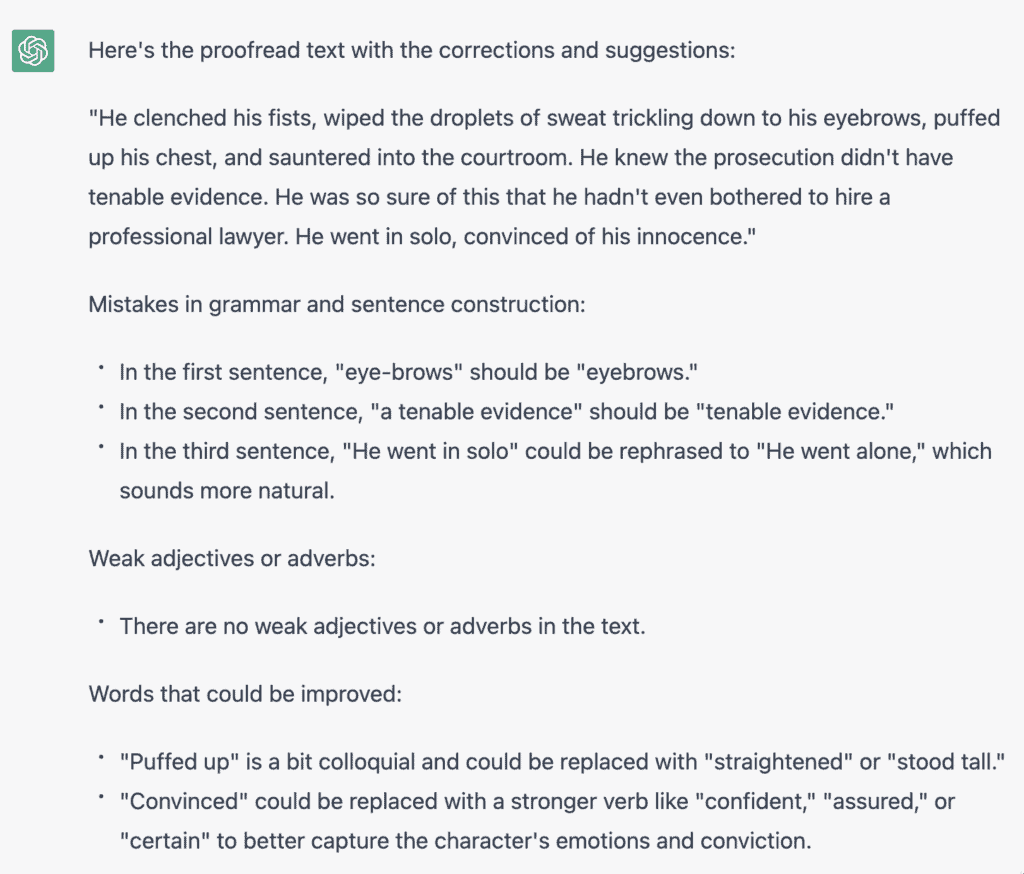
Sweet!
3. Replace weak adjectives, adverbs, and verbs
Professional writers despise the use of adjectives and adverbs, but they harbor an even stronger dislike for weak ones. And for a good reason: weak words make your writing flabby and bloated.
Sample these two sentences:
— The professor became very angry and started talking loudly with the student.
— The professor became furious and started yelling at the student.
The second sentence is tighter and conveys emotions better than the first one. It paints a vivid picture while the first one just explains the scene.
In the first sentence, the words very and loudly are adverbs that modify the words angry (adjective) and talk (verb).
We can ask ChatGPT to point out such weak parts of speech and suggest stronger words for them.
Try this prompt:
I am writing a story. I tend to use a lot of weak adverbs, adjectives and verbs. I want you to act like the greatest proofreader and vocabulary master on the planet and point out such weak parts of speech that are weighing down my sentences.
For example, “very angry” can be replaced by “furious” or “livid”, “talk quietly” can be replaced by “whisper” or “mutter” or “mumble” depending on the context.
Here’s the text: “He knew he had screwed up. He wasn’t the brightest person in the earth but he was wise enough to discern the changing countenance of his audience. He had uttered something that was so contrary to the stance taken by his party. He knew he would be fired. He had climbed up the political ladder after so many machinations only to give it all up just because of slip of tongue.”
Here’s how ChatGPT responded:
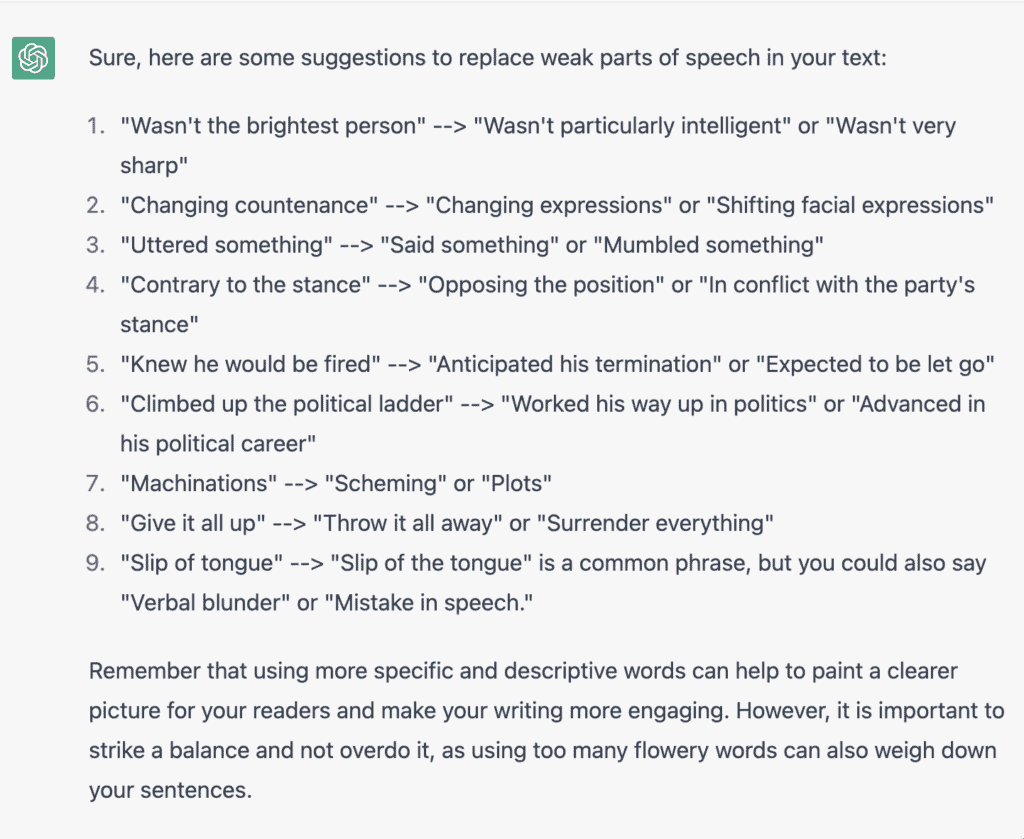
Good enough!
In fact, I have written an article on how to shoot up the clickthrough rate of your headlines using stronger, hyperbolic adjectives.
In another article, I generated a list of punchy, purposeful alternatives to common adjectives that can spruce up your otherwise bland headlines.
4. Ask ChatGPT for word gradations
It is often said that no two words in the English language are exact synonyms of each other. What are commonly grouped together as synonyms in a thesaurus are actually near-synonyms that sometimes are interchangeable but they all have their nuances and connotations. They have different shades of meaning that make them distinct in their own right.
For example, the verbs whisper, mutter and mumble are all a type of the verb “speak” but they have very similar but different meanings.
These near-synonyms are what I call word gradations.
If you are writing a piece of work that you want to be regarded as high quality, using the exact word will make the most impact.
Thanks to ChatGPT, access to these word gradations have never been easier.
Here’s how you use it: Suppose one of the characters in your story is walking just after being shot in the leg. Now you are thinking if ‘walk’ is the correct verb for his gait. Well, try this prompt in ChatGPT:
Words have gradations. Synonyms often have their nuances and connotations. I want you to give me 15 such near-synonyms of the verb “walk” with their meaning, nuances and 2 example sentences.
The data should be in the Markdown table format with columns “Word”, Meaning, Nuances, 2 Example sentences.
Output:
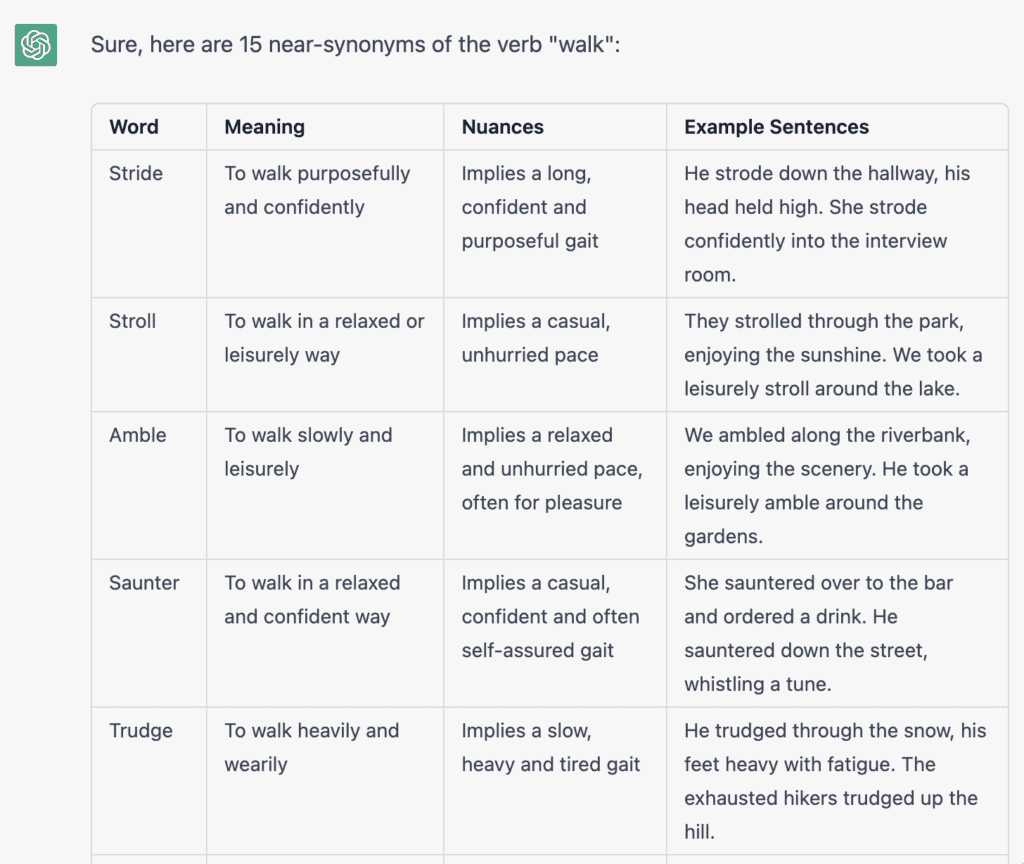
If this list is incomplete, you can simply ask ChatGPT to write 10 more and it will do it happily.
If you still don’t find what you are looking for, you just explain your predicament to ChatGPT and ask him for the right word —
One of the characters in my story just got shot in the leg. He is now walking. Which words best describes his walk now?
Output:
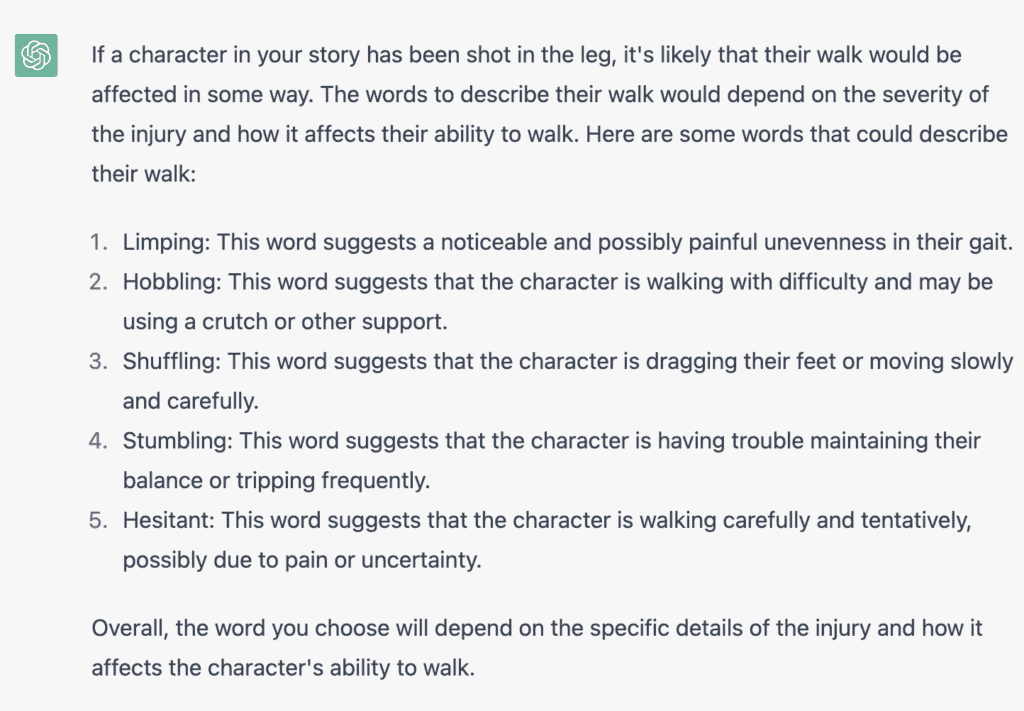
ChatGPT produced a list of 5 possible words that can describe our character’s walk.
I have to say, using ChatGPT this way is a sure-shot way to skyrocket your active vocabulary and refine your writing.
5. Generate collocations
Collocations are words that are often used together such as “bright idea” or “heavy rain”.
If ever writing a sentence, you have wondered what verbs come before accident or what adjectives generally describe a person’s laugh, you are looking for collocations.
For example, these are the collocations of the laugh (noun):

You can ask ChatGPT to give you a list of collocations for any word, be it a verb, adjective, or noun.
Collocations are words that often come together. Give me a list of adjectives that generally come before the noun “laugh”.
Output:
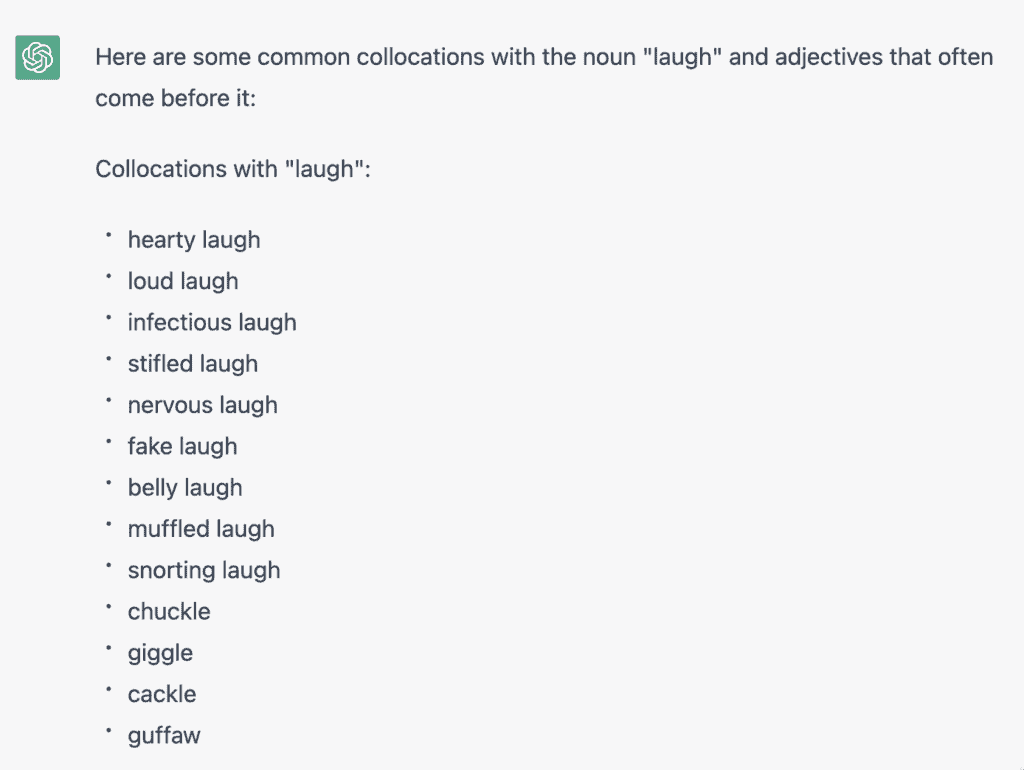
Though, it didn’t give me the exhaustive list that I wanted, even in 4-5 attempts.
Seems like you are better of with Freecollocation.com for now.
Conclusion
In the end, writing is an art that needs practice, patience, and hard work. By using the tips outlined in this post, you can upgrade your writing skills with ChatGPT.
You can simply ask ChatGPT to rewrite a piece of text or to proofread your work. ChatGPT can also help you replace weak adjectives, adverbs, and verbs with stronger versions.
You can even ask ChatGPT to generate a list of word gradations and collocations.
The crucial thing is to use these tips regularly and on purpose. Whether you’ve been writing for a long time or have just started, these tips will enhance your writing skills tremendously and get your point across easily.
Also read: 5 Best AI Writers for Academic Writing (Free and Paid)
So, use ChatGPT to your advantage and start writing like a pro right away!
What other tips do you use with ChatGPT to improve your writing? Let me know on Twitter.
Thanks for reading.